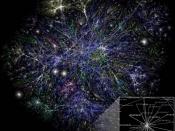Prior to the 21st century society greatest inventions were the automobile, the telephone, the airplane as a means of communication and transportation. Now individuals are blessed with the Internet. It is commonly regarded that the Internet is a manifesto of technology that allows human beings to interact with one another using networking services. The Internet has broken down the barriers and means of traditional communication. In cyberspace, people can talk with each other regardless of location. It can be defined as a "unique medium" with no geographical location but available to anyone (p. 21). It is not only used for communication but information searching, listings of products and services, advertising of large/small businesses, and much more. In essence, the Internet can be regarded as a separate entity from our own physical world - a digital utopia. The question being raised is, with the large scale of the internet, how is it maintained or even controlled? Jack Goldsmith and Tim Wu's book Who Controls the Internet? Illusions of a Borderless World gives a perfect example of how the Internet is being directly (and indirectly) controlled by territorial government.
As each section of the book is uncovered, it is clearly pointed out that national governments through control of local and global intermediaries and coercion exercise dominate control over the digital empire. The book is subdivided into three large sections. In the first section Wu and Goldsmith marks the impression to the readers that the Internet is in fact a "libertarian state" where users can freely express themselves. The authors argue at the commencement of the Internet there are no actual "rulers" or "governors" of the Internet rather it was the upheaval of a Digital American Revolution, that's built on "language and reason and our fail in each other" (p. 22). The authors...


